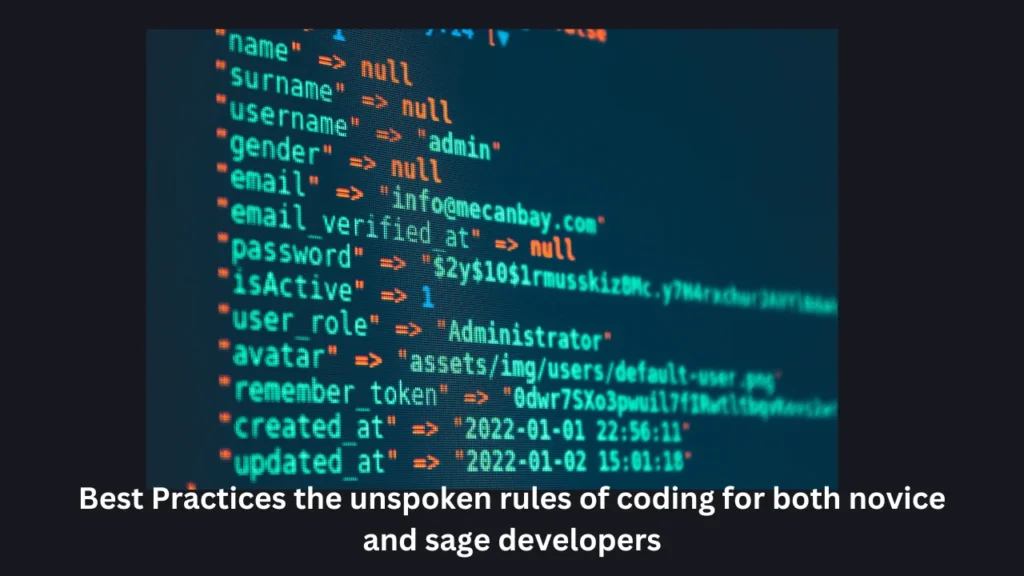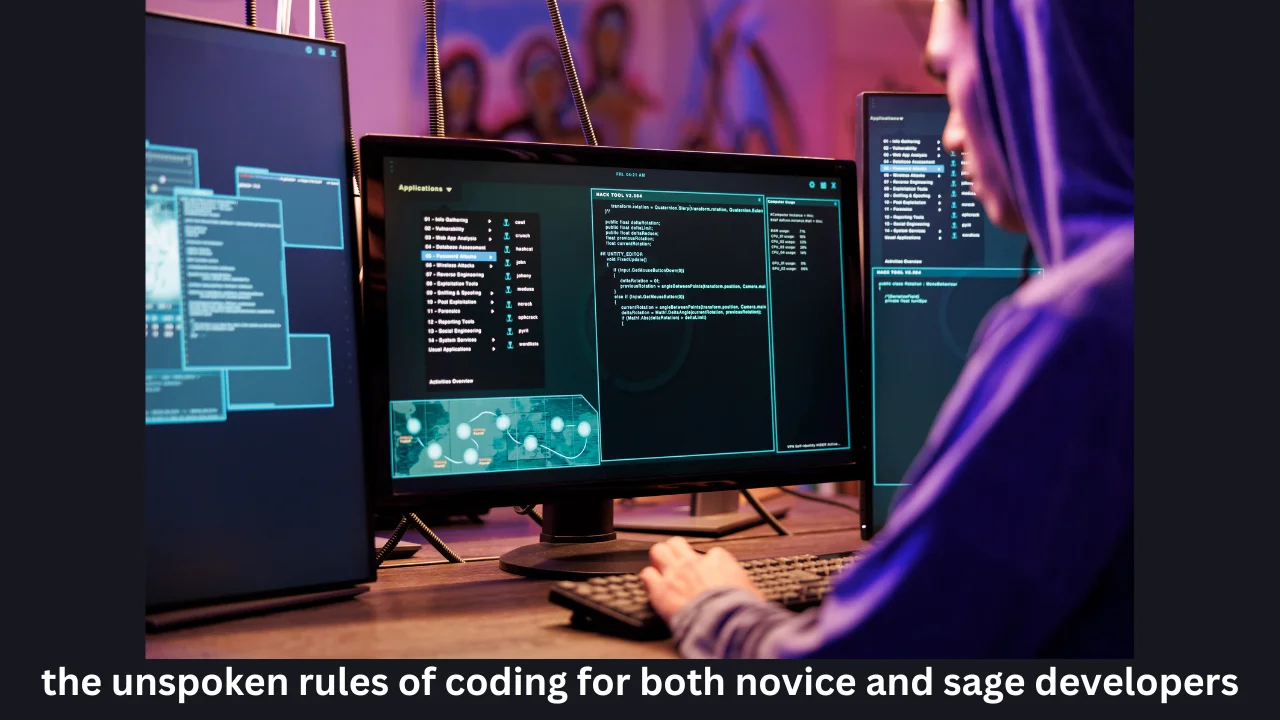Coding is more than just writing lines of code; it’s about creating something meaningful and functional. The unspoken rules of coding for both novice and sage developers are essential for ensuring that the code is not only effective but also maintainable and scalable. Whether you are new to programming or have years of experience, these rules will help you write better code and collaborate more effectively.
What is the unspoken rules of coding for both novice and sage developers
The unspoken rules of coding for both novice and sage developers are a set of informal yet crucial guidelines that go beyond technical skills. These rules emphasize writing clean, readable, and maintainable code, following consistent naming conventions, and prioritizing efficiency and clarity. They also highlight the importance of proper documentation, thorough testing, and effective collaboration through practices like code reviews and version control. Understanding and adhering to these unspoken principles helps developers at all levels produce high-quality code and work effectively in team environments.
| Rule | Description |
|---|---|
| Clean and Readable Code | Use meaningful names, maintain proper structure, and avoid overly complex solutions. |
| Consistent Coding Standards | Follow naming conventions, indentation, and formatting rules to maintain code uniformity. |
| Comment and Document | Write clear comments and documentation to explain complex logic and facilitate team collaboration. |
| Avoid Code Duplication | Reuse existing code instead of duplicating it to reduce redundancy and potential errors. |
| Test and Debug Thoroughly | Write unit tests and debug systematically to ensure code quality and functionality. |
| Embrace Version Control | Use version control systems like Git to manage changes, track history, and collaborate effectively. |
| Refactor Regularly | Continuously improve code structure and remove unnecessary complexity to maintain code health. |
| Prioritize Efficiency | Focus on writing efficient and optimized code to improve performance and scalability. |
| Continuous Learning | Keep up with industry trends and best practices to enhance coding skills and adaptability. |
Understanding the Basics
For novice developers, the initial learning curve can be steep. Understanding the fundamental concepts of coding, such as syntax, data structures, and algorithms, is crucial. However, it’s equally important to grasp the unspoken rules that seasoned developers follow.
Commenting and Documentation
One of the unspoken rules of coding for both novice and sage developers is the importance of commenting and documenting your code. While it may seem like a tedious task, proper comments and documentation make it easier for others to understand your code. This is especially important in collaborative environments where multiple developers may work on the same project.
Why Commenting Matters:
It helps others understand what your code does, making it easier to maintain and debug.
What to Document:
Document the purpose of the code, the logic behind complex algorithms, and any known issues.
Clean and Readable Code
Writing clean and readable code is not just about aesthetics. It’s about ensuring that your code is easy to understand and maintain. This is a fundamental part of the unspoken rules of coding for both novice and sage developers.
Consistent Naming Conventions
Using consistent naming conventions for variables, functions, and classes makes your code more readable. For instance, use camelCase for variables and PascalCase for class names. This consistency helps others quickly grasp the structure and purpose of your code.
Avoiding Code Smells
Code smells are signs of potential issues in your code. They may not cause immediate problems, but they can make your code harder to maintain in the long run. Common code smells include overly long methods, duplicated code, and excessive comments.
Code Efficiency and Optimization
Efficiency and optimization are key aspects of the unspoken rules of coding for both novice and sage developers. While it’s important to write code that works, it’s equally important to write code that works efficiently.
Time Complexity and Space Complexity
Understanding time and space complexity is crucial for writing efficient code. These concepts help you determine how your code will perform as the input size grows. For example, a function with O(n) time complexity will perform linearly with the input size, while a function with O(n^2) time complexity will perform quadratically, which can be significantly slower.
Testing and Debugging
Testing and debugging are integral parts of the coding process. The unspoken rules of coding for both novice and sage developers emphasize the importance of thoroughly testing your code to catch errors before they become bigger problems.
Unit Testing
Unit testing involves testing individual components of your code to ensure they work as expected. This is especially important when adding new features or modifying existing ones. It helps ensure that changes do not break existing functionality.
Debugging Techniques
Debugging is not just about finding and fixing errors. It’s about understanding the root cause of an issue and finding a solution that doesn’t create new problems. Common debugging techniques include using print statements, breakpoints, and specialized debugging tools.
Collaboration and Communication
Effective collaboration and communication are crucial for any development team. This is a core part of the unspoken rules of coding for both novice and sage developers.
Version Control Systems
Using version control systems like Git is essential for collaborative coding. It allows multiple developers to work on the same project simultaneously without overwriting each other’s work. It also provides a history of changes, making it easier to track and revert to previous versions if needed.
Code Reviews
Code reviews are a valuable tool for improving code quality. They provide an opportunity for developers to learn from each other and identify potential issues before the code is merged into the main project.
Continuous Learning and Adaptation
The field of coding is constantly evolving, with new languages, frameworks, and tools emerging all the time. One of the unspoken rules of coding for both novice and sage developers is the commitment to continuous learning and adaptation.
Keeping Up with Industry Trends
Staying updated with the latest trends and technologies in the coding world is essential. This not only helps you improve your skills but also makes you more versatile and adaptable in a rapidly changing industry.
Learning from Mistakes
Mistakes are inevitable in coding, but they are also valuable learning opportunities. Analyzing and understanding your mistakes can help you avoid them in the future and improve your coding skills.
Balancing Work and Personal Life
While coding can be highly engaging, it’s important to maintain a balance between work and personal life. The unspoken rules of coding for both novice and sage developers include taking care of your mental and physical well-being.
Avoiding Burnout
Burnout is a common issue among developers, especially when working on challenging projects or tight deadlines. Taking regular breaks, setting realistic goals, and maintaining a healthy work-life balance are crucial for avoiding burnout.
The Importance of Soft Skills
In addition to technical skills, soft skills play a significant role in a developer’s success. The unspoken rules of coding for both novice and sage developers highlight the importance of effective communication, teamwork, and problem-solving skills.
Effective Communication
Being able to clearly explain your ideas, both verbally and in writing, is crucial for collaboration. Whether you’re discussing project requirements with a client or explaining a complex algorithm to a teammate, effective communication is key.
Problem-Solving Skills
Coding is essentially about solving problems. The ability to break down a problem into smaller, manageable parts and find effective solutions is a valuable skill for any developer.
Best Practices the unspoken rules of coding for both novice and sage developers

Regardless of your experience level, following best practices is essential for writing quality code. These best practices are a core part of the unspoken rules of coding for both novice and sage developers.
Regularly Refactor Your Code
Refactoring involves restructuring your existing code without changing its behavior. This helps improve code readability, reduce complexity, and make your code more maintainable.
Use Code Linters and Formatters
Code linters and formatters help enforce coding standards and improve code quality. They can automatically detect syntax errors, enforce consistent formatting, and highlight potential issues.
Frequently Asked Questions
What are the basic unspoken rules of coding?
The basic unspoken rules include writing clean code, commenting, using version control, and continuous learning.
Why is commenting important in coding?
Commenting helps others understand your code, making it easier to maintain and debug, especially in collaborative projects.
How can I improve my coding efficiency?
Improving coding efficiency involves understanding time and space complexity, writing optimized code, and regularly refactoring.
Conclusion
The unspoken rules of coding for both novice and sage developers provide a roadmap for writing efficient, maintainable, and collaborative code. Whether you are just starting out or have years of experience, adhering to these principles will help you become a better developer and contribute more effectively to any project.
